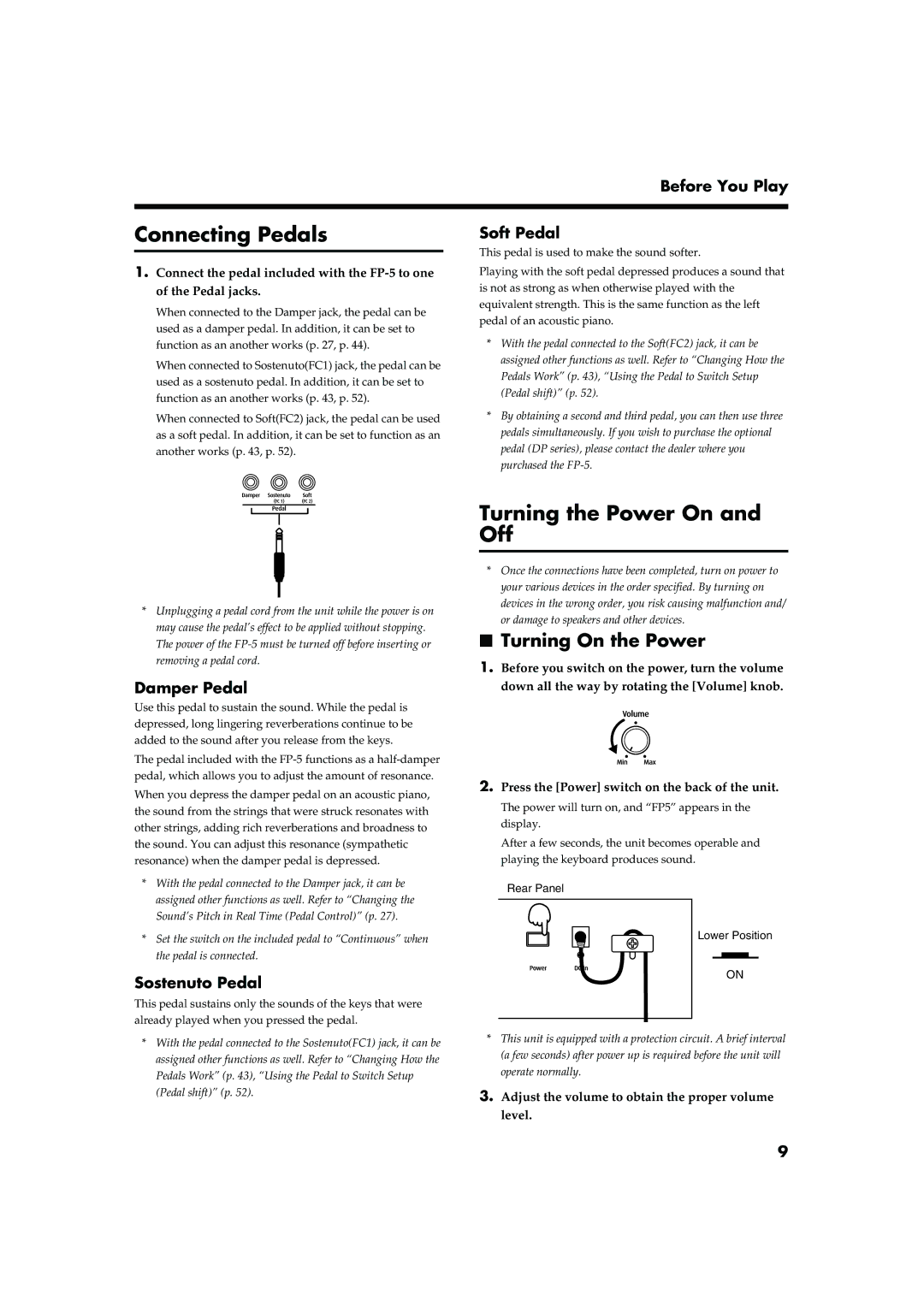
Before You Play
Connecting Pedals
1.Connect the pedal included with the
When connected to the Damper jack, the pedal can be used as a damper pedal. In addition, it can be set to function as an another works (p. 27, p. 44).
When connected to Sostenuto(FC1) jack, the pedal can be used as a sostenuto pedal. In addition, it can be set to function as an another works (p. 43, p. 52).
When connected to Soft(FC2) jack, the pedal can be used as a soft pedal. In addition, it can be set to function as an
another works (p. 43, p. 52).
Soft Pedal
This pedal is used to make the sound softer.
Playing with the soft pedal depressed produces a sound that is not as strong as when otherwise played with the equivalent strength. This is the same function as the left pedal of an acoustic piano.
*With the pedal connected to the Soft(FC2) jack, it can be assigned other functions as well. Refer to “Changing How the Pedals Work” (p. 43), “Using the Pedal to Switch Setup (Pedal shift)” (p. 52).
*By obtaining a second and third pedal, you can then use three pedals simultaneously. If you wish to purchase the optional pedal (DP series), please contact the dealer where you purchased the
*Unplugging a pedal cord from the unit while the power is on may cause the pedal’s effect to be applied without stopping. The power of the
Damper Pedal
Use this pedal to sustain the sound. While the pedal is depressed, long lingering reverberations continue to be added to the sound after you release from the keys.
The pedal included with the
When you depress the damper pedal on an acoustic piano, the sound from the strings that were struck resonates with other strings, adding rich reverberations and broadness to the sound. You can adjust this resonance (sympathetic resonance) when the damper pedal is depressed.
*With the pedal connected to the Damper jack, it can be assigned other functions as well. Refer to “Changing the Sound’s Pitch in Real Time (Pedal Control)” (p. 27).
*Set the switch on the included pedal to “Continuous” when the pedal is connected.
Sostenuto Pedal
This pedal sustains only the sounds of the keys that were already played when you pressed the pedal.
*With the pedal connected to the Sostenuto(FC1) jack, it can be assigned other functions as well. Refer to “Changing How the Pedals Work” (p. 43), “Using the Pedal to Switch Setup (Pedal shift)” (p. 52).
Turning the Power On and Off
*Once the connections have been completed, turn on power to your various devices in the order specified. By turning on devices in the wrong order, you risk causing malfunction and/ or damage to speakers and other devices.
■Turning On the Power
1.Before you switch on the power, turn the volume
down all the way by rotating the [Volume] knob.
2.Press the [Power] switch on the back of the unit.
The power will turn on, and “FP5” appears in the display.
After a few seconds, the unit becomes operable and
playing the keyboard produces sound.
Rear Panel
Lower Position
ON
*This unit is equipped with a protection circuit. A brief interval (a few seconds) after power up is required before the unit will operate normally.
3.Adjust the volume to obtain the proper volume level.
9
